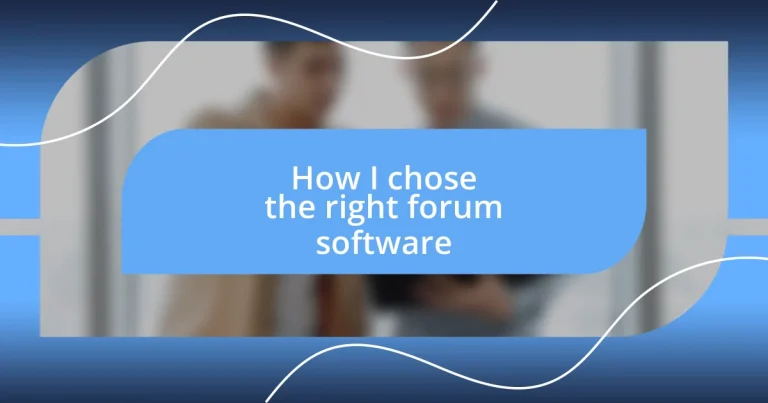Key takeaways:
- Identifying specific needs and target audience is essential for selecting suitable forum software, ensuring scalability and future growth.
- Evaluating key features like customization, user experience, security, and moderation tools is crucial to fostering an engaging and safe community.
- Gathering and integrating user feedback is vital for continuous improvement and building a collaborative community atmosphere.
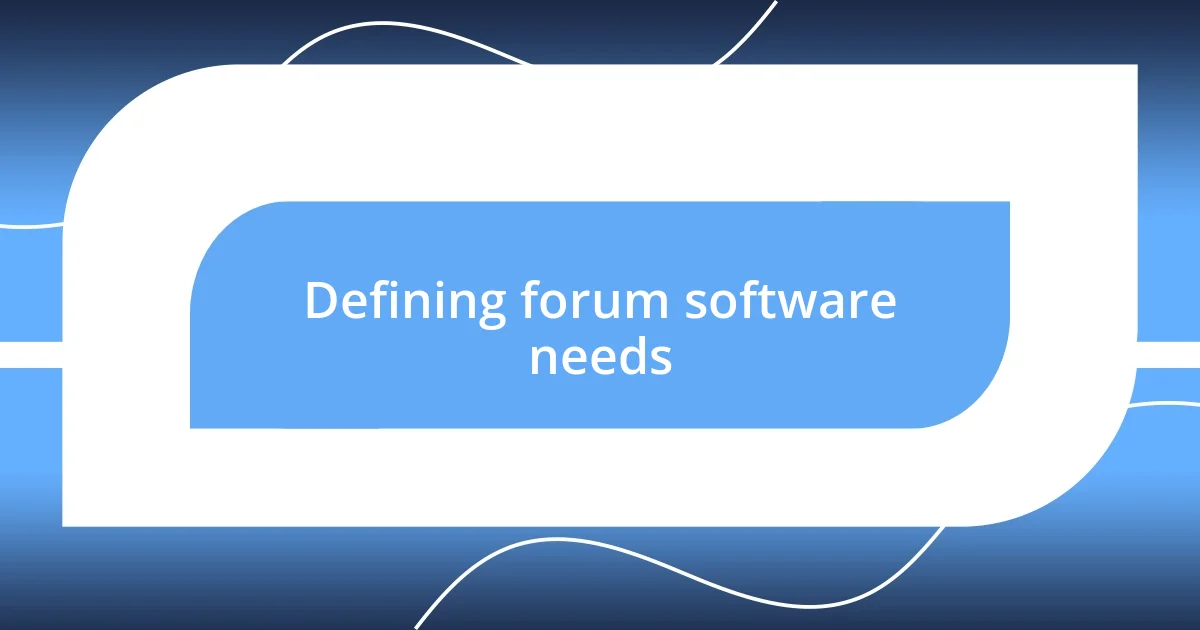
Defining forum software needs
When I started exploring forum software, I realized the importance of identifying my specific needs upfront. What types of interactions did I envision? Knowing whether I wanted a simple Q&A format or something more dynamic with threads and multimedia support truly shaped my options.
As I dug deeper, I found myself asking questions about the community I aimed to cultivate. Would my forums attract hobbyists sharing tips, or were we aiming for serious discussions among experts? Understanding the target audience helped clarify whether I needed features like gamification or strict moderation tools.
It’s also crucial to consider scalability. I once chose a platform based on its user-friendliness, but as my community grew, so did my frustrations with limitations. I realized that planning for future growth—such as the potential for thousands of users—was essential. How would I feel if I outgrew my software just months after launching? That’s a scenario I wanted to avoid at all costs.
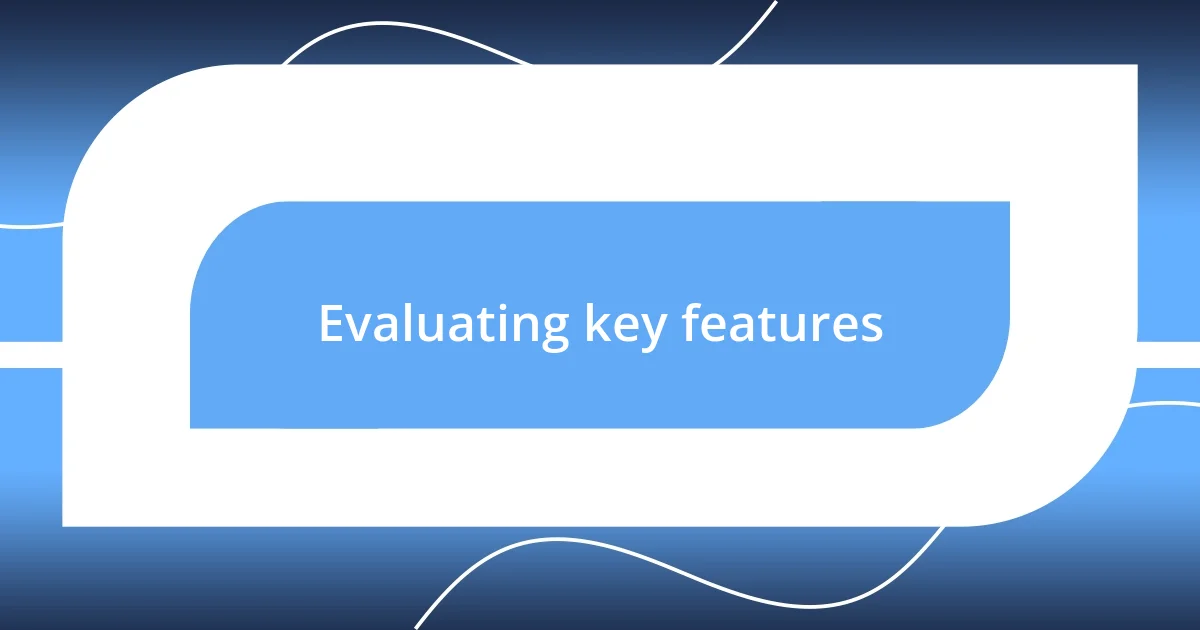
Evaluating key features
When I began evaluating the features of different forum software, I felt a mix of excitement and anxiety. It was like shopping for the perfect toolset; each feature offered a glimpse into how my community could function and engage. I quickly learned that not all features are created equal. Here are some of the key aspects I focused on:
- Customization: I needed to ensure the software allowed me to brand the forum to create a welcoming atmosphere.
- User experience: Smooth navigation and mobile compatibility were non-negotiable for me. I recalled feeling frustrated on platforms that weren’t user-friendly—definitely not the environment I wanted to foster.
- Security: Protecting user data was paramount, especially considering some sensitive discussions we planned to have.
- Moderation tools: The ability to manage discussions effectively, with options for banning or promoting users, influenced my decisions greatly.
As I delved deeper into the features, I realized that not every tool I encountered would fit my needs. Some platforms boasted flashy aesthetics but lacked solid backend functionality. I shared this realization with a friend who is also in the tech space, and we both chuckled at how easily we’d been seduced by appearances before. I found it essential to look beyond the surface, focusing on how each feature could contribute to a more vibrant and secure community experience.
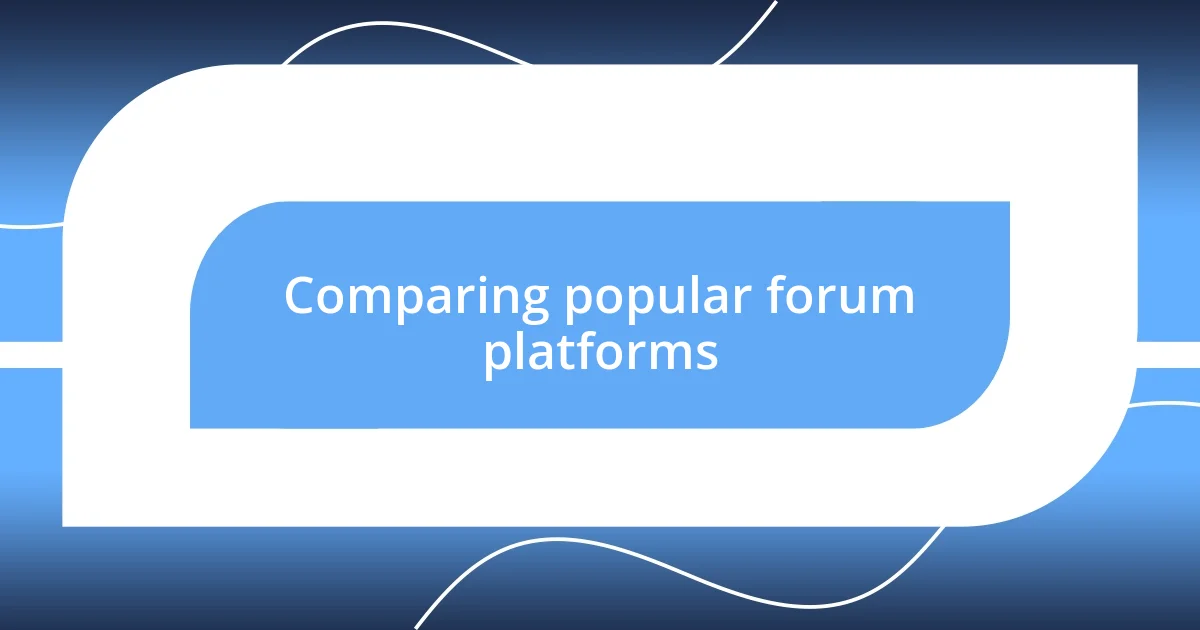
Comparing popular forum platforms
When I started comparing popular forum platforms, I quickly discovered that each one had its own unique advantages and drawbacks. For instance, while some platforms like phpBB offered a wealth of customization options, they often required a steeper learning curve. I remember my first attempt to tweak a phpBB theme; I spent hours trying to figure out the coding, only to end up frustrated and confused. On the other hand, platforms like Discourse provided a more user-friendly experience right out of the box. However, I found that their customization options were somewhat limited, which left me feeling like I was compromising my vision.
Another significant consideration was the community dynamics that each platform could support. For example, I noted that XenForo excelled at encouraging user engagement through gamification features, sparking my curiosity about how this could foster a more active community. When I tested out a demo, I could almost feel the excitement in the air as members earned badges for their contributions. In contrast, Vanilla Forums focused heavily on integrating social media, offering features I thought could engage younger users effectively, though I worried about attracting a more mature audience with that approach.
Security features were also a crucial part of my comparisons. I recall a particularly unsettling incident involving a forum I previously managed, where security vulnerabilities led to significant user data breaches. This experience made me wary. While platforms like vBulletin offered robust security measures, some others seemed less transparent about their safety protocols. I learned that checking reviews and user feedback was key, as community experiences often clarified safety concerns better than promotional materials.
| Platform | Customization | User Engagement | Security |
|---|---|---|---|
| phpBB | High, but technical | Standard | Good |
| Discourse | Medium | High | Strong |
| XenForo | High | Very High | Good |
| Vanilla Forums | Medium | High | Fair |
| vBulletin | Good | Standard | Very Strong |
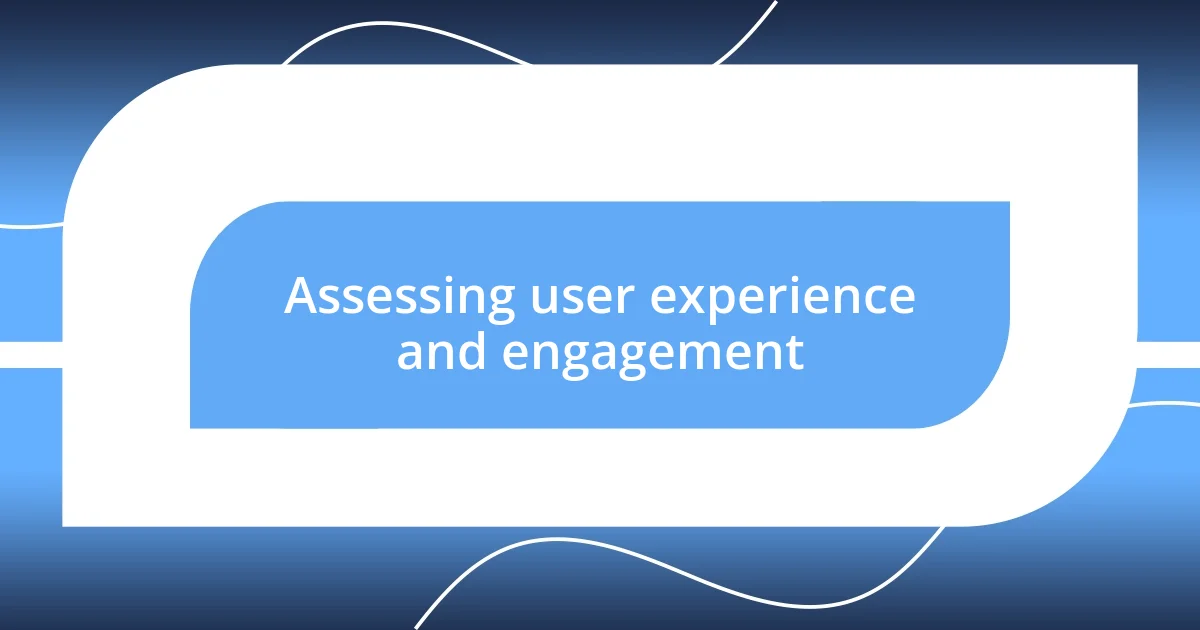
Assessing user experience and engagement
When assessing user experience and engagement, I couldn’t help but think about how vital first impressions are. I remember visiting several forums, and the ones with intuitive layouts instantly drew me in. If a platform feels chaotic or cluttered, I quickly lose interest. It’s crucial for me to find a forum where users can seamlessly navigate, making their experience enjoyable from the moment they log in. Have you ever tried to find something important on a poorly designed site? It’s frustrating, isn’t it?
Diving deeper into engagement metrics, I discovered that features promoting interaction kept users coming back. One platform initially caught my eye with its lively threads and active participation. I vividly recall spending hours conversing over shared interests, feeling more like a part of a community than a mere user. Gamification elements, such as rankings and achievements, can create a buzz that fosters loyalty—who doesn’t love a little recognition for their contributions?
It’s also essential to pay attention to user feedback. I found platforms that allowed users to easily share their opinions and experiences provided rich insights into the community atmosphere. There’s something almost reassuring about seeing genuine conversations in a support forum, as it indicates users feel valued and heard. When I engaged with others discussing their experiences, I could sense their passion and investment, which ultimately influenced my choices significantly. Wouldn’t you want a community where your voice matters?
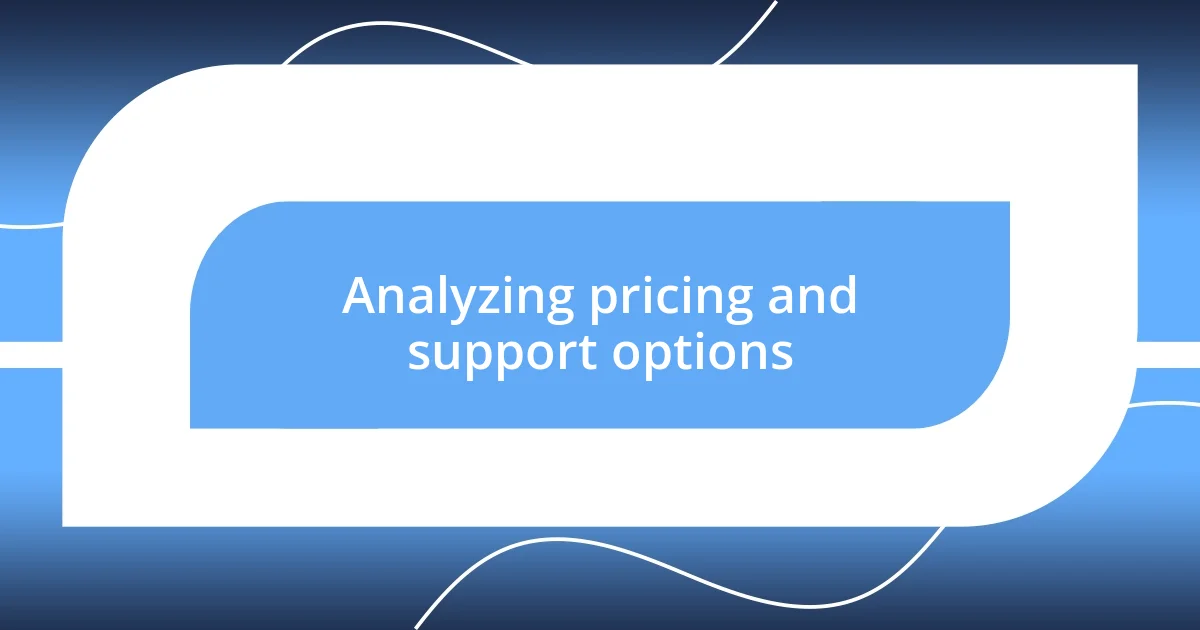
Analyzing pricing and support options
When analyzing pricing options for forum software, I quickly learned that costs vary widely, often depending on the features offered. I remember my surprise when discovering that some platforms had on-premise pricing, requiring hefty upfront costs but providing long-term control. In contrast, subscription models appealed to me because of their predictable monthly fees, making it easier to budget. I often ask myself: Is it worth stretching my finances for a premium solution when more budget-friendly options exist?
Support options were just as crucial in my decision-making process. I vividly recall one incident where I encountered a technical glitch during a critical moment just before a community event. I desperately needed reliable support to resolve the issue. Some forums provided excellent customer service, offering 24/7 chat support that felt like having a safety net, while others left me waiting for days. It’s easy to overlook support options until you’re in a bind. At that moment, I realized that having responsive support could make or break my experience.
Furthermore, I found that community-driven support could be incredibly valuable too. Platforms with robust user forums not only facilitated peer assistance but often filled in the gaps when official support was lacking. I vividly recall receiving prompt advice about a customization from another user when my platform’s help desk was unreachable. This direct community involvement fostered a collaborative atmosphere that I deeply appreciated. Ultimately, I learned that pricing and support needed to align with my forum’s vision and community needs, making that analysis an essential part of my selection process.
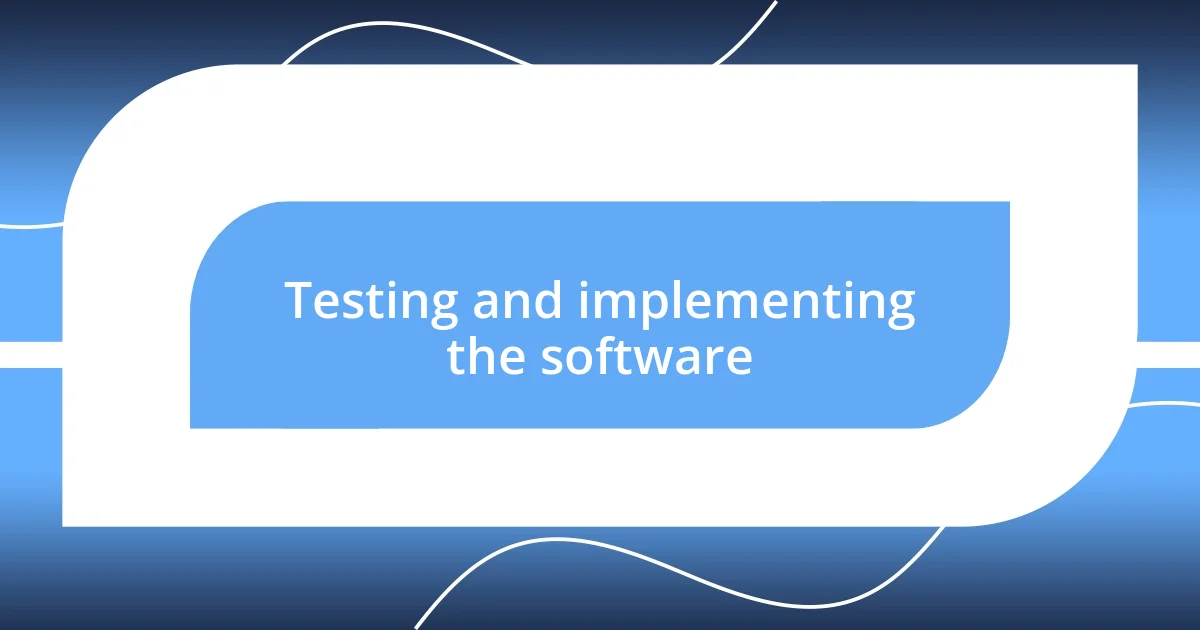
Testing and implementing the software
Once I narrowed it down to a few options, the real fun began: testing the software. I set up trial accounts to explore these platforms firsthand. I was excited to dive in, but I also found myself feeling somewhat apprehensive. Would the features live up to their promises? I can’t tell you how satisfying it was to discover that a user-friendly interface allows customization without a steep learning curve. That moment when I realized I could tweak settings instantly and see the changes was a game-changer for me.
As I began to implement the software, I took the opportunity to get feedback from potential users in my community. I organized a small group to test drive the platform. I remember the buzz in the room as everyone navigated through the forum together, sharing their impressions. Their enthusiasm and differing perspectives opened my eyes to features I hadn’t initially considered, like mobile compatibility and notification settings. Isn’t it fascinating how other users can help refine our understanding of what truly matters in a platform?
After a few weeks of testing, it was time to make a decision. The anticipation was palpable! I aimed to create a space that felt inviting, so I focused on a seamless onboarding process for new members. Each decision I made was guided by user experience, technical support, and those pivotal testing moments. Reflecting on it, I realized that implementation wasn’t just about launching software—it was about fostering a community where every voice feels valued and heard. How could I not take that into account when choosing the right platform?
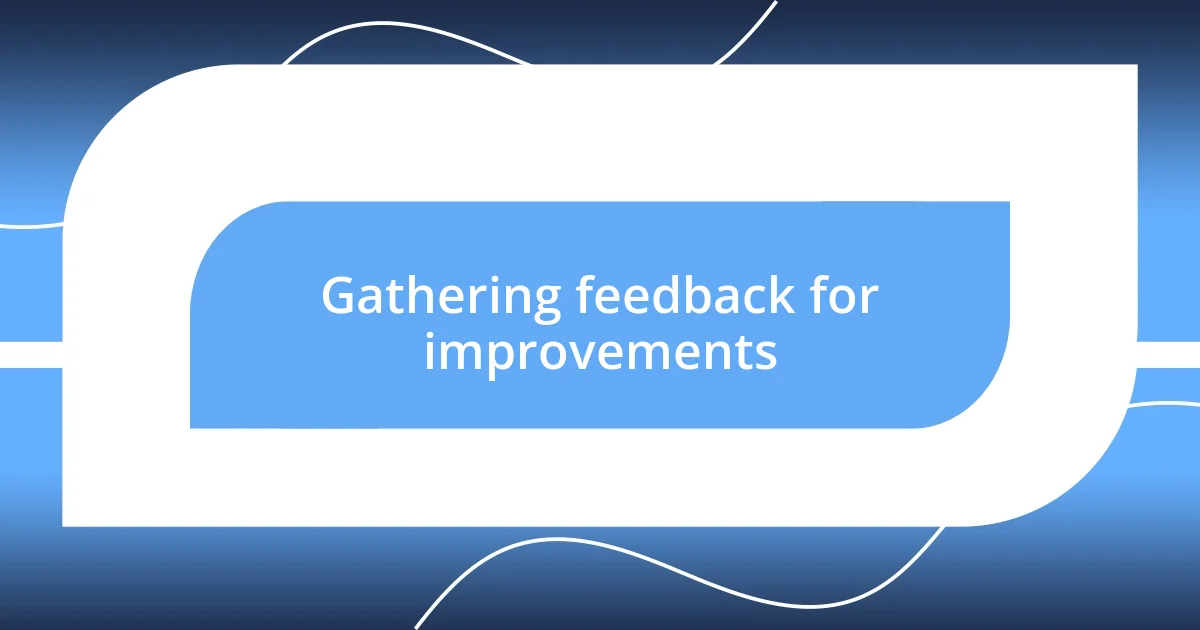
Gathering feedback for improvements
Gathering feedback for improvements is an essential part of my journey with forum software. I vividly remember my first attempt at collecting user insights. I sent out a quick survey to my initial group of testers, and the responses came pouring in. The excitement of seeing users share their thoughts was electric! Some pointed out minor bugs, while others suggested features that I had never considered—like a dark mode for late-night discussions. Their feedback didn’t just help me improve the forum; it made me feel part of a collaborative effort, transforming what could have been a lonely journey into a shared adventure.
As I sifted through the feedback, I felt a mix of gratitude and responsibility. One suggestion to streamline the navigation stuck with me, as it came from a member who had difficulty finding topics. I could almost feel their frustration. Embedding a user’s voice into the design choices transformed my approach; I realized that their experiences were just as important as my initial vision. This insight led me to hold regular feedback sessions. Engaging with my community in this way not only built trust but also encouraged more members to share their ideas openly. Isn’t it empowering to create a space where feedback is not only welcomed but celebrated?
Moreover, I discovered that feedback isn’t a one-time event; it’s an ongoing conversation. After implementing changes based on user suggestions, I’d follow up with the same group to ask, “How’s it working now?” Their responses often revealed layers of understanding I hadn’t anticipated. Each conversation fueled my motivation to adapt and improve continuously. It became clear to me how crucial it is to nurture this dialogue. By cultivating a feedback culture, I felt my community grow closer, united by a shared vision of improving our platform together. Isn’t that what building a forum is all about?












